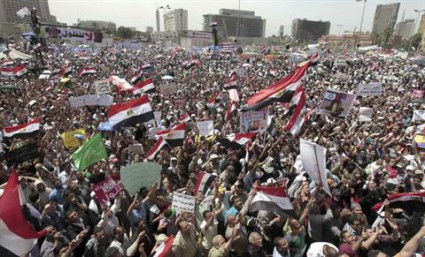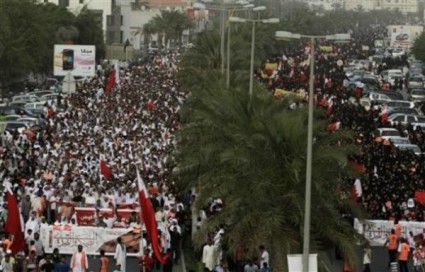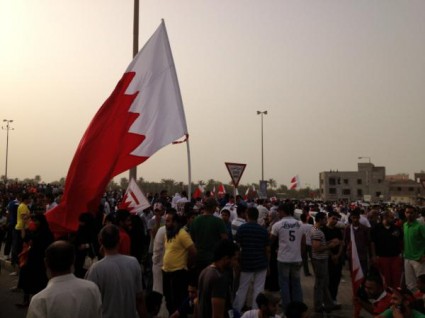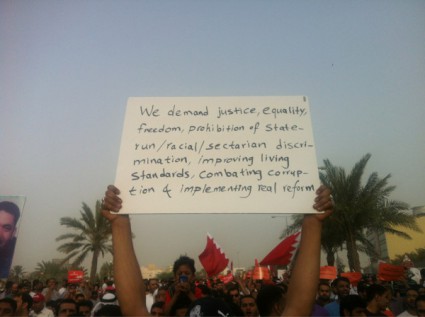Time for Technology Companies to Stand Up for Human Rights
Time for Technology Companies to Stand Up for Human Rights
18 April, 2012 – EFF
San Francisco – It’s time for technology companies that sell surveillance and filtering equipment to step up and ensure they aren’t helping governments in committing human rights violations. In a white paper released today entitled “Human Rights and Technology Sales,” EFF outlines how corporations can avoid assisting repressive regimes.
The paper calls on companies to increase transparency of their dealings with potentially repressive regimes and to implement “Know Your Customer” standards for auditing technology sales, including review of the purchasing government’s technical questions and customization requests. If the review indicates that the technologies or transactions may be used to facilitate human rights violations, the company should refrain from participating.
“Authoritarian governments around the world often rely on technologies built in North America and Europe to spy on their citizens – including listening in to cell phone calls, scanning crowd photographs with facial recognition tools, and monitoring mobile networks with voice recognition technology. These can have deadly ramifications for activists and others in repressive regimes,” said EFF Director for International Freedom of Expression Jillian York. “We’re asking companies to take responsibility for the uses that governments make of their products, instead of acting like ‘repression’s little helper.'” …more
April 20, 2012 No Comments
Julian Assange’s The World Tomorrow: Hassan Nasrallah (E1)
April 20, 2012 No Comments
F1 Sites “Tango Down” – Anonymous Success
Hackers target F1 websites over Bahrain GP
20 April, 2012 – The Daily Star – AP
LONDON: Hacking collective Anonymous has claimed responsibility for a denial-of-service attack on the official Formula One website in protest over the running of the Bahrain Grand Prix this weekend.
The group also attacked F1-racers.net where it posted a message saying the “Formula 1 racing authority was well-aware of the Human Rights situation in Bahrain and still chose to contribute to the regime’s oppression of civilians and will be punished.”
The Bahrain Grand Prix is going ahead despite violent clashes between riot police and demonstrators who believe the race should not be held until the government ends its rights abuses and enacts concrete reforms that benefit the Shiite majority.
Formula1.com was unavailable to many users for some of the day Friday. Denial-of-service attacks work by overwhelming a website with bogus traffic.
…more
April 20, 2012 No Comments
Bahrain F1 cuts deeper than insult, its an assault on human decency and is contemptuous to freedom
CNN: Bahrain’s Formula1 is an insult to country’s democratic reformers
By Maran Turner – Special to CNN – 20 April, 2012
(CNN) – “Unified: One nation in celebration” is the jubilant slogan of this year’s Formula 1 Grand Prix in Bahrain. The irony could not be harsher: while sports fans look forward to this glamorous race, one of the country’s most prominent human rights activists is close to death in protest of his ongoing unlawful detention.
Solidarity protests in the streets continue to be brutally suppressed. From the perspective of a majority of Bahrain’s population, it is not one nation. And it is certainly not celebrating.
One day after the race, on April 23, the Bahrain government will announce a decision that may determine the island kingdom’s fate.
This decision is whether to release Abdulhadi al-Khawaja, a well-known and internationally respected human rights activist in Bahrain. While the watchful international community is hoping for release, it is entirely possible that the decision may only be a call for a new trial. Mr. al-Khawaja is unlikely to survive long enough to participate in a sham trial.
Since February 8, while most of us have enjoyed more than 200 meals including breakfast, lunch, and dinner each day, Mr. al-Khawaja has had zero. Not a morsel of food in over 70 days. He is on a hunger strike and his intentions have been clear from the beginning — freedom or death.
When Bahrain erupted in protests last spring — the Arab Spring — Abdulhadi al-Khawaja emerged as a central figure in the peoples’ (in particular the Shi’a minority’s) struggle for democracy. This is not a surprise to people who are familiar with his more than 20 years of human rights advocacy. But after suffering greatly at the hands of authorities and being convicted on bogus security charges by a military tribunal, the advocate has become a victim of Bahrain’s abuse and a symbol of its intolerance. …more
April 20, 2012 No Comments
“Forces for Good” torture and abuse Bahraini citizens in custody
April 20, 2012 No Comments
U.S. Senators Call for Release of Freedom Now Client Abdulhadi al-Khawaja
For Immediate Release: U.S. Senators Call for Release of Freedom Now Client Abdulhadi al-Khawaja
20 April, 2012 – Freedom Now
Today, four members of the United States Senate, including Senators Richard Durbin (D-Il), Robert Casey (D-PE), Marco Rubio (R-Fl), and Ron Wyden (D-OR) requested Prime Minister Khalifa bin Salman Al Khalifa to release longtime human rights advocate Abdulhadi al-Khawaja. In the letter, attached, the Senators declared:
We write to urge your government to release Mr. Abdulhadi al-Khawaja on urgent humanitarian grounds. . ..Mr. al-Khawaja’s continued imprisonment has placed his life in jeopardy and threatens to further inflame tensions in Bahrain. We recognize that your government has made progress on some of the recommendations of the BICI report, and we encourage additional efforts to advance an inclusive political dialogue that will address issues raised by peaceful protestors and will put Bahrain on a path of long-term stability.
Freedom Now Executive Director Maran Turner stated: “Freedom Now echoes the urgent call by these Senators, who join thousands of voices all over the world, on the Bahrain government to release Mr. al-Khawaja, and to make meaningful progress in the reform process. The Bahrain government holds Mr. al-Khawaja’s life in its hands, and is doing so with no basis in law. If Mr. al-Khawaja is not released soon, he will surely die. The Government of Bahrain must demonstrate compassion and respect for international law and immediately release Abdulhadi al-Khawaja.”
Abdulhadi al-Khawaja is a prominent human rights defender imprisoned in Bahrain for his outspoken advocacy in the pro-reform protests in Bahrain. He is more than 70 days into a hunger strike, which he began on February 8 to protest his imprisonment and the inhumane treatment to which he was subjected by Bahraini authorities. Arrested April 9, 2011, he was charged with alleged state security crimes, and on June 22, was sentenced to life in prison. Mr. al-Khawaja was denied justice on appeal. However, at the end of last year an independent commission of inquiry (BICI) called for civilian retrials for those who had been convicted by military tribunals. A new verdict in Mr. al-Khawaja’s case is expected on Monday, April 23. …more
April 20, 2012 No Comments
Bahrain’s “forces for good” murdering children and using F1 money to fund the killing
F1 race ‘is force for good’, says Bahrain Crown Prince
By Andy Sambidge – 20 April, 2012 – arabian business.com
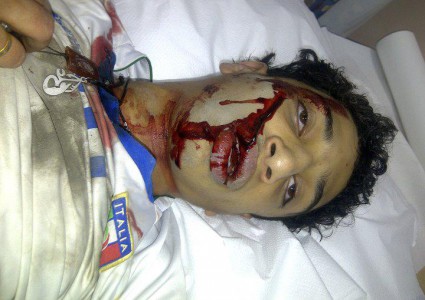
Bahrain’s “forces for good” deliberately shot 14 year old Ali Jawad Ahmad in head from 3 meters with gas canister
Bahrain’s Crown Prince Salman bin Hamad Al-Khalifa said on Friday that Sunday’s race would go ahead despite growing tensions in the Gulf kingdom.
Addressing media at the Sakhir Circuit, he said cancelling the race would “empower extremists”, adding that he was “here to go racing”.
“I genuinely believe this race is a force for good… We are not trying to say we are perfect. We are a real country with real issues,” the Crown Prince, who was instrumental in bringing Formula One to the country in 2004, said.
“For those of us who are trying to navigate a way out of this political problem, having the race allows us to build bridges across communities and get people working together. [The race] allows us to celebrate out nation as an idea that is positive, not one that is divisive,” he added.
He added that he could guarantee that any problems seen over the race weekend “were not directed at Formula One”.
He insisted that he would not regret not cancelling the race, saying: “Why should our openness be used against us? The race is the race and we are here to celebrate that. I’m here to go racing.”
And he downplayed calls from UK politicians for the race to be called off.
Following comments from Labour leader Ed Miliband and shadow home secretary Yvette Cooper, the Crown Prince said he did not believe their view were representative of the UK political scene.
His comments came after protests had flared in villages surrounding the Bahraini capital on the eve of race weekend.
Police fired tear gas and stun grenades to disperse demonstrators in clashes that have been building in the week leading to Sunday’s round of the World Championship.
On Thursday, Force India tightened up their security procedures after petrol bombs were thrown near a car taking staff back to their hotel from the Bahrain Grand Prix circuit.
The team said two staff, one a data engineer and the other a radio contractor, had decided to return home to Britain after the incident.
Bahrain has been in turmoil since a democracy movement erupted last year following uprisings in Egypt and Tunisia.
Protests were initially crushed with the loss of dozens of lives, but youths still clash daily with riot police in Shi’ite Muslim districts, and thousands take part in opposition rallies.
April 20, 2012 No Comments
Bahrain: Indiscriminate Use of Chemical Gas as Weapon against General Population
Bahrain: Investigation Reveals Indiscriminate Use of Tear Gas
PHR concerned about possible increase in miscarriages due to prolonged tear gas exposure
PHR – Cambridge, Mass. – 19 April, 2012
Upon returning from an investigation in Bahrain, Physicians for Human Rights (PHR) today criticized the Government’s indiscriminate and systematic use of tear gas against civilian protesters and densely populated Shia neighborhoods. PHR calls for the immediate suspension of the use of this toxic gas because of its suspected severe health impact on the population.
“Despite promises of reform since our investigation to the Kingdom last year, the Government’s excessive use of force has only increased. Security forces now strategically use tear gas –its innocuous-sounding name belies its deadliness – as a potentially lethal weapon against men, women, children, and the elderly alike,” said Richard Sollom, Deputy Director of PHR. “More troubling is the Government’s pattern of attack. Not only do security forces target street protesters, they go out of their way to shoot or throw tear gas into civilian homes. We may be beginning to see serious longer-term health consequences among people routinely exposed to high doses of this toxic gas. Based on our findings, PHR is concerned about possible increased rates of miscarriage and birth defects in Bahrain.”
According to recent reports, the Government of Bahrain has arrested about 60 leading democracy activists in an attempt to contain anti-government protests ahead of this weekend’s Formula One Grand Prix race.
“When all eyes turn to Bahrain this weekend to watch the Formula One race, we cannot forget the protesters who are being constantly attacked by their own government,” said Dr. Holly Atkinson, PHR’s Immediate Past President and co-investigator. “Last week, I saw young children regularly exposed to tear gas and spoke with women who had suffered miscarriages, which might be due to prolonged tear gas exposure. Even worse, many of these vulnerable people are afraid to go to a hospital for care.”
PHR investigators found continued militarization of Bahrain’s healthcare system, including systematic interrogation of suspected protesters arriving at Salmaniya Hospital. In April 2011, PHR released the report Do No Harm, [pdf] which detailed Bahrain’s attacks on physicians, medical staff, and patients.
“By militarizing the country’s medical system, the Government of Bahrain has succeeded in intimidating and subduing a vulnerable population—the sick and wounded. Many patients are afraid to seek care and instead are utilizing private hospitals or an ad hoc community network of care provided by medics and civilians,” said Dr. Atkinson.
Patients and medical staff alike are protected under the principles of medical neutrality, and PHR calls on the Government of Bahrain to respect these principles and cease intimidation of the medical community and those who seek care. …more
April 20, 2012 No Comments
Where is pro-democracy blogger Ali Abdulemam missing since last years cancelled F1
April 20, 2012 No Comments
Militarization of Syrian Uprising – The Free Syria Army, ‘You guys have stolen our revolution! You are just as bad as the shabiha’
The Militarization of the Syrian Uprising
By Samer Araabi – 20 April, 2012 – FPIP
Excerpt from Foreign Policy in Focus Special Project
With the Syrian cease-fire hanging on by a thread, many observers are speculating whether the lull in violence will empower the anti-regime forces in Syria. To be sure, many of the individuals who have taken up arms against Bashar Al-Assad’s ossified and reprehensible government have risked their lives for the noblest of ideals. But such ideals are not necessarily shared by the entire opposition, as the case of Mohamed Alloush demonstrates. Alloush, a pro-democracy activist who participated in the mass uprising that gripped Syria last year, has fled to Lebanon, driven away not only by the violence of the regime, but by pressure from opposition forces.
“In September last year I had been arrested again by the regime for organizing protests,” Mr. Alloush said in an interview with the Christian Science Monitor. “After they released me, I ran into a group of men I knew as members of the Free Syrian Army. I walked up to them and screamed: ‘You guys have stolen our revolution! You are just as bad as the shabiha,’” the pro-regime militia in Syria.
The uprising in Syria has been an inspiring demonstration of the desire for freedom, justice, and human dignity, as well as a heartbreaking reminder that such aspirations are often not achieved. …more
April 20, 2012 No Comments
Bahrain blood on tracks – Labour Ed Miliband says, “Grand Prix in Bahrain should not go ahead”
Bahrain Grand Prix should not go ahead, says Ed Miliband
20 April, 2012 – BBC
Labour leader Ed Miliband: “Given the violence we’ve seen… I don’t think the Grand Prix should go ahead”
Labour leader Ed Miliband has said the Grand Prix in Bahrain should not go ahead, amid continuing protests against the government.
He said the race should be stopped due to “human rights abuses” and urged the government to “make its view clear”.
Amnesty International says Bahrain faces a “human rights crisis”.
Prime Minister David Cameron said peaceful protests should be allowed – but reform had begun in Bahrain and it was a matter for Formula 1.
Mr Miliband’s intervention comes after his shadow home secretary, Yvette Cooper, called on British Formula 1 drivers such as Jenson Button and Lewis Hamilton to boycott Sunday’s race.
‘Weigh in’
The Labour leader told journalists the government could “weigh in and express its view” to put pressure on Formula 1 to stop the race going ahead.
“Given the violence we have seen in Bahrain, given the human rights abuses, I don’t believe the Grand Prix should go ahead and I hope that the government will make its view clear and say the same.”
A woman and boy walk past graffiti urging the boycott of the 2012 Bahrain Grand Prix (18 April 2012) Unrest on the island forced the cancellation of the 2011 Bahrain Grand Prix
But Prime Minister David Cameron said: “It’s a matter for Formula 1, but let me be clear, we always stand up for human rights and it’s important that peaceful protests are allowed to go ahead.
“But I think we should be clear that Bahrain is not Syria, there is a process of reform underway and this government backs that reform and wants to help promote that reform.”
‘Blood on tracks’
However, Liberal Democrat president Tim Farron echoed calls for the race to be stopped, saying “it endorses and legitimises the regime”.
And Respect MP George Galloway said: “There is blood on the tracks and anyone who drives over them will never be forgiven.”
Bahrain Grand Prix circuit Protesters plan three ‘days of rage’ to disrupt the Bahrain Grand Prix
Protests against the government have been going on for more than a year.
This week Bahraini security forces fired stun grenades at protesters in the capital Manama, 25 miles away from the race circuit.
Last year’s race was cancelled after 35 people were killed during demonstrations.
On Wednesday, members of one team, Force India, were caught up in clashes between protesters and security forces. The four mechanics had to flee when petrol bombs were thrown near their car. …more
April 20, 2012 No Comments
Bahrain Sanad Protest Demands Stop to F1
April 20, 2012 No Comments
Tens of thousands protest military’s rule in Egypt
Tens of thousands protest military’s rule in Egypt
Aya Batrawy – Agence France Presse – 20 April, 2012
CAIRO: Tens of thousands of protesters packed Cairo’s downtown Tahrir Square on Friday in the biggest demonstration in months against the ruling military, aimed at stepping up pressure on the generals to hand over power to civilians and bar ex-regime members from running in upcoming presidential elections.
Both Islamists and liberals turned out in force for the protest, to show the widespread anger at the military over the country’s political chaos ahead of the first presidential elections since the fall of Hosni Mubarak more than a year ago. The confusion has raised suspicions the generals ruling since Mubarak’s ouster are manipulating the process to preserve their power, ensure the victory of a pro-military candidate and prevent reform.
“Down with military rule,” protesters in Tahrir chanted, and banners draped around the sprawling plaza denounced candidates seen as “feloul,” or “remnants” from Mubarak’s regime.
But the crowds in Tahrir were divided between rival groups with differing complaints and goals. As a result, the participants failed to reach a unified list of demands.
Liberals and youth groups called for all factions to agree on an anti-military “revolution” candidate in the presidential vote, but the powerful Muslim Brotherhood and other Islamists – who have their own ambitions in the race – refused to sign on.
The Brotherhood, Egypt’s strongest political movement, has been frustrated that the military has prevented their domination of parliament from translating into real political power. The group was angered when the military-appointed election commission over the past week disqualified its initial candidate for president, along with nine other hopefuls.
In response, the Brotherhood is calling for a “second revolution.”
Liberals and the youth groups who led the revolt against Mubarak, however, are skeptical, accusing the Brotherhood of abandoning the revolution the past year to pursue their own quest to rule. The Brotherhood largely stayed out of anti-military protests since Mubarak’s fall and accepted the generals’ running of the transition, betting that the process would pave their way to political power.
Many in the secular camp demand the Brotherhood “apologize” for its actions the past year and show it is not intent on monopolizing power.
Khaled al-Balshi, editor of the leftist Al-Badeel news site, said he feared that Islamists are once again using the protests as a card to pressure the military council and would go back to striking deals with it again later.
“I am afraid that right now there is something being cooked,” he told Al-Jazeera television.
Another major force in the square were the ultraconservative Salafis, an Islamic movement that is more hard-line than the Brotherhood. Many of them are furious over the disqualification of their favored presidential candidate, Hazem Abu Ismail, who was barred from the race because his mother held American citizenship. Election rules bar a candidate’s close family from having foreign citizenship. Many of his supporters accuse the military and election of commission of forging documents to force out the popular Abu Ismail.
…more
April 20, 2012 No Comments
Bahrain Protest on eve of Grand Prix told not to come
April 20, 2012 No Comments
Bahrain’s “Concord Moment” and the “shot heard around the world”
World leaders are calling for the cessation of Bahrain’s 2012, as the nation comes unraveled after the Kingdoms brutal King Hamad, orders a violent crackdown on peaceful protesters in the streets of Bahrain, as “trial laps” begin what has now become the Worlds “Great Race of Shame”.
The Western Governments have, here until now kept a position of “silence” about King Hamad’s misdeeds and brutality. The arrival of the international media, which has been repeatedly blocked from access to Bahrain over the past year has put new focus on the bloody Kingdom. Bahrain’s protests for release of political detainees and calls for democracy have continued day and night since the 14 February, 2011 demonstrations at the now demolished Pearl Monument.
Today’s calls by world leaders to stop the Bahrain F1 against a backdrop of regime brutality is truly Bahrain’s “Shot heard around the world”. The caveat, just as it was in Concord Massachusetts after the “shot that was heard around the world” was fired, will be the bloody aftermath of torture and murders that will plague the Kingdom after the F1 is gone and the press has cleared the decks. Phlipn.
Ralph Waldo Emerson – 1803-82, was a key early American philosopher, poet and writer, particularly known for his appreciation of individualism, self-reliance and intuition. He wrote the poem “Concord Hymn”, which was sung at a July 4, 1837 ceremony to mark the completion of the Concord Monument, to immortalize the resistance of American Minutemen to British forces on April 19, 1775. The poem’s phrase “shot heard round the world” is now internationally famous for its description of the philosophical importance of the American revolution
Concord Hymn
by Ralph Waldo Emerson
By the rude bridge that arched the flood,
Their flag to April’s breeze unfurled,
Here once the embattled farmers stood,
And fired the shot heard round the world.
The foe long since in silence slept;
Alike the conqueror silent sleeps;
And Time the ruined bridge has swept
Down the dark stream which seaward creeps.
On this green bank, by this soft stream,
We set to-day a votive stone;
That memory may their deed redeem,
When, like our sires, our sons are gone.
Spirit, that made those heroes dare
To die, and leave their children free,
Bid Time and Nature gently spare
The shaft we raise to them and thee.
April 20, 2012 No Comments
Bahrain’s “Shot Heard Around the World” – International calls to STOP F1 as Protesters shot down in Streets
Democracy campaigners in Bahrain and politicians around the world are calling for this Sunday’s Formula 1 race in the Gulf state to be canceled as violent clashes continue between activists and authorities.
Why Is Bahrain F1 Race Under Fire?
Peter Wilkinson – CNN – 20 April, 2012
(CNN) — Democracy campaigners in Bahrain and politicians around the world are calling for this Sunday’s Formula 1 race in the Gulf state to be canceled as violent clashes continue between activists and authorities. What are the issues around the controversy, and how are the sport and its fans reacting? Why are there calls for this weekend’s Grand Prix in Bahrain to be scrapped? Opposition groups in Bahrain as well as politicians, rights groups and many F1 fans around the world want Sunday’s Grand Prix — which could be watched by a global audience of more than 500 million — to be canceled while the Gulf state braces itself for more violent demonstrations after months of political unrest.
Protesters see the race as a publicity stunt by the country’s rulers to make the nation seem more unified than it actually is. The Bahrain Grand Prix was canceled last year amid a Shiite-led uprising against the Sunni monarchy and a government crackdown in which dozens were killed and hundreds detained.
Nabeel Rajab, an opposition protester, said the demonstrators were not against the Formula One race itself. “We are just against the government or the oppressive ruling elite using that as PR,” Rajab said.
In Britain, where many F1 teams are based, opposition leader Ed Miliband said: “Sport and politics generally shouldn’t mix, but … what kind of signal does it send to the world when this grand prix is going ahead, given the concerns there are, given the violence we have seen in Bahrain, given the continuing issues around human rights?
“I don’t think it’s the right decision to let this grand prix go ahead and I think the government needs to weigh in and express its view.”
And opposition politician Yvette Cooper urged British F1 stars Jenson Button and Lewis Hamilton to pull out of the race. “It shouldn’t go ahead, I don’t think British drivers should go. I think the Formula 1 should not go ahead in Bahrain,” Cooper told the BBC.
But UK Prime Minister David Cameron refused to join the calls, insisting it was a matter for the F1 authorities whether the race went ahead. “It is important that peaceful protests are allowed to go ahead,” he said. Why are protests now taking place in Bahrain? Shiite opposition groups in the Sunni-ruled kingdom say they want equality, and have posted calls on social networking sites for daily protests during the Grand Prix weekend, to focus media attention on their demands.
The government has sought to ban protests in the capital Manama but that has failed to prevent violent clashes in the capital between demonstrators and authorities, who are accused of heavy-handed tactics.
The government has condemned violence on all sides — saying that any police officers found guilty of heavy-handed tactics would be held to account and that protesters should behave in a civil manner as well.
An Amnesty International report this week says promised reforms in Bahrain are inadequate and fail to provide justice for victims of human rights violations.
Protesters are also demanding the release of jailed activist Abdulhadi al-Khawaja, who has been on hunger strike for more than 70 days. Al-Khawaja, 52, was arrested in April 2011 for his role in anti-government protests that began a month earlier with demands for political reform and greater freedoms for Shiites.
In June, Bahrain found him and seven other Shiite opposition activists guilty of plotting to overthrow the country’s royal family.
The government also stands accused of punishing its own national sporting heroes and accusing them of being traitors. International and local human rights groups say three players in the Bahraini national soccer squad were arrested last year, along with more than 150 sportsmen, women and administrators. It is unclear how many remain in jail.
The authorities maintain they were part of illegal, violent protests. Could protesters disrupt the race or threaten spectators? This is the big question. Protesters have vowed to protest near the Sakhir circuit, which is about 25 miles (40 kilometers) from Manama, but witnesses there say there is a heavy police presence on the road between the track and the airport.
The unrest makes hosting the race precarious because the racers must pass through some areas where clashes have occurred to get to the circuit, which is in the desert.
On Thursday protesters burned tyres, briefly blocking several main roads leading to Sakhir. A Molotov cocktail exploded late Wednesday near a car carrying members of one F1 team, Force India, during clashes between protesters and security forces. No one was reported injured in the incident. …more
April 20, 2012 No Comments
Bahrain Grand Prix: “Small protest” against King Hamad and Bernie Ecclestones Bloody Grand Prix – 20 April, 2012
Western media has been significantly under reporting the size of demands, referring to protests as “small” and angry. They are not small and the protesters are way past angry – they are Revolutionary. It would seem the F1 teams and their sponsors have failed to comprehend the reality of hold a race in a nation under revolution or the are so greedy they are comfortable trampling the blood of the those who have given their lives for the revolution. Either way, the teams and their sponsors are stupid as fuck and it seems they will reap a harvest from disrespect they have sown. Phlipn.
April 20, 2012 No Comments
Bahrain Oppostion List of Demands
April 20, 2012 No Comments

